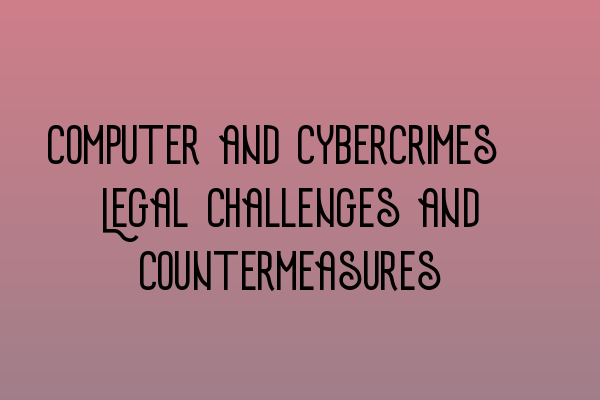Computer and Cybercrimes: Legal Challenges and Countermeasures
Welcome to our blog post on computer and cybercrimes. In today’s digital age, technology has revolutionized the way we communicate, work, and conduct business. However, along with its numerous benefits, the digital world has also introduced new challenges and risks in the form of computer and cybercrimes. In this post, we will explore the legal challenges posed by these crimes and discuss the countermeasures that can be taken to address them.
Understanding Computer and Cybercrimes
Computer and cybercrimes encompass a wide range of illegal activities that are carried out using computers, networks, and the internet. These crimes can involve theft, fraud, hacking, identity theft, copyright infringement, and more. The rapid advancement of technology has provided criminals with new tools and methods to commit these offenses, making them harder to detect and prosecute.
One key challenge in combating computer and cybercrimes is the jurisdictional issue. Due to the borderless nature of the internet, criminals can operate from anywhere in the world, making it difficult for law enforcement authorities to apprehend and bring them to justice. As a result, international cooperation and collaboration among law enforcement agencies have become essential in addressing these crimes effectively.
The Legal Framework
To tackle computer and cybercrimes, a robust legal framework is necessary. Governments and legal authorities around the world have enacted laws and regulations specific to these offenses, recognizing the urgency and severity of the issue. These laws often cover areas such as unauthorized access to computer systems, data breaches, electronic fraud, and cyberstalking.
In the United Kingdom, the Computer Misuse Act 1990 is the primary legislation that governs computer-related crimes. This act criminalizes unauthorized access to computer systems, as well as activities such as hacking, creating or distributing malware, and denying access to authorized users.
Additionally, the Data Protection Act 2018 (DPA) plays a crucial role in protecting individuals’ personal information from unauthorized disclosure or misuse. Under the DPA, organizations are required to handle personal data securely and in compliance with certain principles.
Challenges Faced by Legal Authorities
While there are legal provisions in place, law enforcement authorities often face significant challenges in investigating and prosecuting computer and cybercrimes. One of the main challenges is the rapidly evolving nature of technology, which makes it difficult for legislation to keep up with new methods and tactics used by cybercriminals.
Another significant challenge is the complexity of these crimes. Cybercriminals are often highly skilled and technologically advanced, making it challenging for law enforcement agencies to understand and track their activities. This complexity is compounded by the use of encryption and anonymization techniques, which can further hinder investigations.
Countermeasures and Prevention
Given the ever-growing nature of computer and cybercrimes, prevention is key. Individuals and organizations must take proactive steps to protect themselves from falling victim to these offenses.
First and foremost, it is crucial to invest in robust cybersecurity measures. This includes using strong and unique passwords, regularly updating software and operating systems, implementing firewalls and antivirus software, and encrypting sensitive data.
Education and awareness are also vital in preventing cybercrimes. By educating themselves about common tactics used by cybercriminals, individuals can recognize and avoid potential threats. Organizations should also provide cybersecurity training to their employees and develop clear guidelines and policies regarding the safe use of technology and handling of sensitive information.
Conclusion
Computer and cybercrimes are complex and ever-evolving challenges that require a multidimensional approach. Governments, legal authorities, organizations, and individuals must work together to develop and implement effective countermeasures. By staying informed, implementing robust security measures, and promoting awareness, we can better protect ourselves and mitigate the risks associated with computer and cybercrimes.
For more information on related topics, check out these articles:
